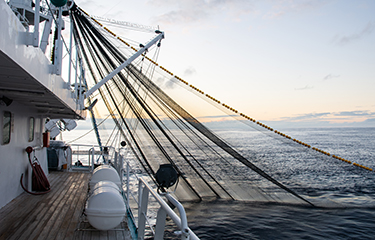The International Seafood Sustainability Foundation (ISSF) is urging the Inter-American Tropical Tuna Commission (IATTC) to protect bigeye and yelowfin stocks by ensuring all its commission members are fully implementing conservation measures.
ISSF published a position statement ahead of the IATTC's upcoming annual meeting acknowledging the IATTC's tuna-conservation efforts while also pushing for it to follow through on its enacted measures with member-states.
“The IATTC demonstrated their commitment to maintaining healthy tuna catches – with bigeye of greatest concern – through the new tuna conservation measures it adopted in 2021,” ISSF President Susan Jackson said. “We are gratified that the current stock indicators show that bigeye and yellowfin fishing morality has not increased beyond sustainable levels set by the measure and that the interim assessment of skipjack is positive. Now it is essential that all parties fully implement these measures and cooperate to enhance port sampling that will help maintain skipjack, bigeye, and yellowfin stocks at healthy levels into the future.”
ISSF is a global coalition of seafood companies, fisheries experts, and scientific and environmental organizations united to promote science-based initiatives for long-term tuna conservation. Its submitted position lists its top priorities for the IATTC to tackle, including full implementation of Res. C-21-04 to ensure the status quo fishing mortality for bigeye and yellowfin is not exceeded. It also called for the IATTC's Individual Vessel Limits Pilot Study for bigeye to be implemented this year.
Furthermore, ISSF is requesting IATTC accelerate its management strategy evaluation process for the tuna populations it manages, and that it establish a work plan to strengthen its review committee’s procedures and outcomes. It also asks for amendments to Res. C-12-07 to create requirements for better reporting and managing of transshipments, alleging the procedure can pose a high risk for illegal, unreported, and unregulated fishing if monitoring, control, and surveillance (MCS) measures are insufficient.
Lastly, ISSF wants the IATTC to address issues with fish-aggregating device (FAD) management in the region.
“We urge the IATTC to also address FAD-management gaps. For example, IATTC still allows netting in FAD construction, has no agreed definition of biodegradable FADs, and does not have an effective FAD-marking scheme or FAD-recovery mechanisms,” Jackson continued. “This year especially, the IATTC must, at a minimum, prohibit the use of netting in FADs and act to transition fleets to the increased use of biodegradable materials. Such changes will reduce the impact of FAD fisheries on the marine ecosystem in the Eastern Pacific Ocean.”
Beyond definitions for biodegradable FADS and prohibited netting in construction, the ISSF focuses on urging the development and adoption of a FAD-marking scheme and ownership rules to aid in the recovery or management to the end of a FAD’s lifetime, by 2023.
Photo courtesy of Gema Alvarez Fernandez/Shutterstock







